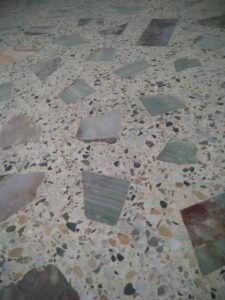Are stubborn rust spots spoiling the grace of your marble? You’re not alone. Marble’s luxurious appeal can easily be tarnished by such imperfections. Worry not, as this post outlines tested techniques to reclaim your marble’s glory.
“While rust marks on your marble might seem untamable, know they’re not indelible. A simple regimen involving a soft brush and baking soda paste can effectively remove these stains. For added protection, finish by sealing your marble surface. Following these steps will soon restore your marble’s inherent charm.”
But that’s just the tip of the iceberg! We have even more information and advice to share, ensuring you become an expert at removing rust stains from marble.
Unearthing the Causes Behind Rust Stains on Marble
Understanding why rust stains develop is the first step to prevention. The main offenders often include metal items that come directly with the marble surface, like metal furniture or pots.
Additionally, the interaction of moisture with the iron elements in the marble can lead to rusting. This is often exacerbated by contact with substances that are either too acidic or too alkaline. Plus, certain cleaning supplies containing harsh acids can also induce rust.
Good maintenance and management of metal objects and liquids are essential for keeping your marble looking its best. Adopting smart preventative measures will help maintain your marble’s initial grandeur for years to come.
Effective Methods to Eliminate Rust from Marble
Marble, cherished for its luxury and durability, is commonly used in flooring, countertops, and artistic pieces. However, it is susceptible to rust stains, which spoil its aesthetic and weaken the structure. Picking the right cleaning methods is critical to safely remove rust and restore the natural beauty of your marble.
How to remove rust stains from marble?
Oxalic acid
- Start by creating a solution of oxalic acid and water. Mix one teaspoon of oxalic acid with a cup of warm water until it dissolves.
- Soak a soft cloth in this solution and apply it to the rust stains.
- Thoroughly wash the area with fresh water and pat it dry with a soft cloth.
- For tougher stains, increase the amount of oxalic acid in the solution by up to two tablespoons.
- If the rust persists, add baking soda to the mixture to help lift the stain from the marble.
- For any leftover residue, combine lemon juice and cream of tartar to make a paste. Spread it over the area, leave it for 30 minutes, then gently scrub with a soft cloth. Rinse and dry thoroughly.
Lemon juice
- Squeeze fresh lemon juice onto the rust-stained area of the marble surface.
- Leave the lemon juice on the surface for about 10-15 minutes.
- Gently scrub the stained area with a soft-bristled brush or cloth.
- Rinse off the lemon juice and any loose rust particles.
- Repeat these steps until the rust stain is entirely gone.
Baking soda
- Create a paste by combining one part of water with three parts baking soda.
- Using a soft cloth, rub the paste into the rust stains.
- Let it sit for 30 minutes.
- Wipe away the paste with a cloth, ensuring that you obliterate it.
- To clean the area, use a cloth drenched in fresh water.
- Allow the marble to dry completely.
Vinegar
- Make a paste by blending vinegar and baking soda to remove marble stains.
- Spread the paste onto the affected spot with a sponge.
- Use circular motions to work the paste into the marble.
- Allow the paste to rest for approximately ten minutes.
- Clean the marble using a moist towel.
- If the stain remains, repeat the process.
Hydrogen peroxide
- To begin, dilute the hydrogen peroxide to create a 1:1 ratio solution.
- Apply the diluted solution onto the stained area of the marble.
- Let the solution sit on the discolored area for at least 15 minutes.
- Rinse away the hydrogen peroxide with lukewarm water.
- For stubborn rust stains, utilize a soft brush or scrubber to help lift them out.
- Dry the area carefully with a soft cloth.
- Complete the process by applying a sealant to safeguard the stone surface against future staining.
Pumice stone
- Submerge pumice stone in a bowl of warm water
- Dip the pumice stone into the warm water
- Then, Rub the pumice stone gently on the rust stain until you remove it.
- Rinse the Surface with a soft cloth
- Repeat if necessary
- Rinse the surface with a clean cloth and dry with a clean towel.
Soft-bristled brush
- Soaking a soft-bristled brush in a solution of water and lemon juice
- Scrubbing the affected area with the brush
- Leaving the solution on for several minutes
- Rinse the area with a damp cloth
- Keep repeating the process until you remove the stain.

Rust Stain Removal for Marble with Chemical Solutions
Rain-X
– Provides deep cleaning on glass shower doors
– Leaves a sparkling shine
– Eliminates hard water spots and residue
– Quick and easy to use
Scrubbing Bubbles
– Scrubbing Bubbles Drop-Ins effectively eliminate tough toilet stains
– The tablets are easy to use. Simply dropping one into the tank will keep your toilet stain-free for up to 4 weeks
– Each flush releases a potential solution that effectively prevents stains caused by hard water, mineral buildup, and limescale.
– Regular use of Scrubbing bubble drop-ins keeps your toilet looking clean and fresh with minimal effort.
Ring Remover
– Abrasive pad comes with a handle for easy usage
– Effective in removing toilet bowl rings
– Helps get rid of rust, scale, and lime
– Does not require additional cleaners
– Straightforward and effortless to use
Wet & Forget
– Wet & Forget Shower is great for preventing hard water stains and calcium deposits
– Using it weekly will help maintain a clean shower
– For severe cases of calcium buildup, a pre-cleaning may be required
Preventing Rust Stains by Sealing Marble
Certain precautions must be taken to maintain the marble’s charming appearance and prevent rust stains. Primarily, proper sealing is required to keep moisture at bay and avoid unsightly rust stains. Additionally, diligently cleaning the surface with a suitable stain remover before applying the sealant is crucial. For stubborn stains, a poultice application can help draw out the stain. Lastly, a high-quality sealant ensures long-lasting protection, keeping your marble surfaces rust-free and gorgeous for years.
Conclusion
Various methods can be used to remove rust stains from marble, such as water and vinegar, lemon juice and baking soda, or a commercial rust remover designed explicitly for marble surfaces. It’s vital to avoid abrasive cleaners or tools that could scratch the marble surface. It’s also advisable to test any cleaning solution on a small, inconspicuous area before applying it to the entire stain.
